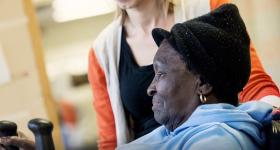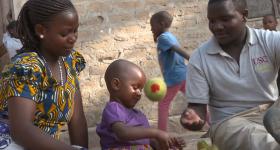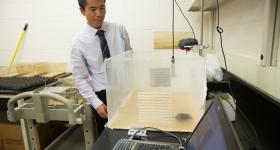Can Cognitive Science Help with Stroke Recovery?
How do the cognitive sciences help with brain injury? Watch the short overview video of some of the work done in the National Rehabilitation Hospital.


Students in the Department of Psychological and Brain Sciences learn to apply psychological theories and methods to solve urgent problems facing individuals, communities and society. Our faculty members are active in mentoring student research, and several have been recognized for their prolific contributions to their fields of study.
Surrounded by the esteemed research and health centers that Washington, D.C., and GW have to offer, psychology students integrate practical experience and research into their coursework, preparing them for a wide range of successful careers.
The mission of the Department of Psychological and Brain Sciences at the George Washington University is to contribute to psychological knowledge and educate undergraduate and graduate students. Our aim is to provide a solid foundation in scientific approaches, psychological theory and education and training in both basic and applied aspects of psychological and brain sciences. Central to this mission is a scientist/practitioner model that emphasizes the development of proficiency in theoretically grounded research and quantitative and qualitative methods to: (1) elucidate cognitive, neural and affective mechanisms as well as social and structural factors driving behavior; (2) advance empirical knowledge about mental and physical health and well-being; and (3) reduce health and social inequities. Our location in Washington, D.C., is ideally suited to our mission.
Our proximity to many of the nation’s leading research institutes and organizations — such as the National Institutes of Health and the National Science Foundation, as well as numerous other nonprofits, think tanks, policy organizations and applied research units — creates opportunities for students to enhance their academic and professional development and training beyond the classroom.
Through our teaching, research and service, we aim to make the world a healthy and equitable place, beginning with our own community. We aim to foster an academic climate that is diverse, equitable and inclusive for all students, faculty and staff. Our goal is to seamlessly infuse these values throughout all aspects of our department, including but not limited to student admissions; faculty hiring, tenure and promotion; academic program curricula and teaching; student and faculty scholarship and research; and department-sponsored programs and events.

Can Cognitive Science Help with Stroke Recovery?
How do the cognitive sciences help with brain injury? Watch the short overview video of some of the work done in the National Rehabilitation Hospital.

Can Cognitive Science Help Detect Cancer?
How do the cognitive sciences save women’s lives? Watch this short video to learn more about breast cancer detection and how cognitive science helps inform how radiologists can best perform their...

The Mothers and Babies Course empowers mothers in Tanzania and Kenya to identify and manage stressors. Studies have shown that adult depression is a major public health concern in the developing...

Counselor, Entrepreneur and Reality TV Host
Isaiah Pickens, BA ’05, once volunteered as a counselor for young people in New York’s Rikers Island prison. The experience stayed with the former psychology major, who is now a well-known counselor...

Determining the Effects of Stressors on Black Men
Applied Social Psychology Professor Lisa Bowleg’s interdisciplinary research team brings together doctoral students from GW and other major research universities to focus on improving mental and...

Quieting the Voices of Schizophrenia
Assistant Professor of Cognitive Neuroscience Guangying Wu is trying to pinpoint the the misfiring neurons that cause agonizing internal noise for people with schizophrenia. His research enlisted the...
Studying Stressors on Black Men
Professor of Applied Social Psychology Lisa Bowleg began a new study in 2018 to reduce drug use and poor health outcomes in black men. The project earned a $3.7 million grant from the Department of...

Student Linking Sleep Disruption and Depression in Pregnant Women
Supported by a National Institutes of Health grant, clinical psychology PhD candidate Sammy Dhaliwal set out to test how sleep deprivation contributes to depression in pregnant and postpartum women....
